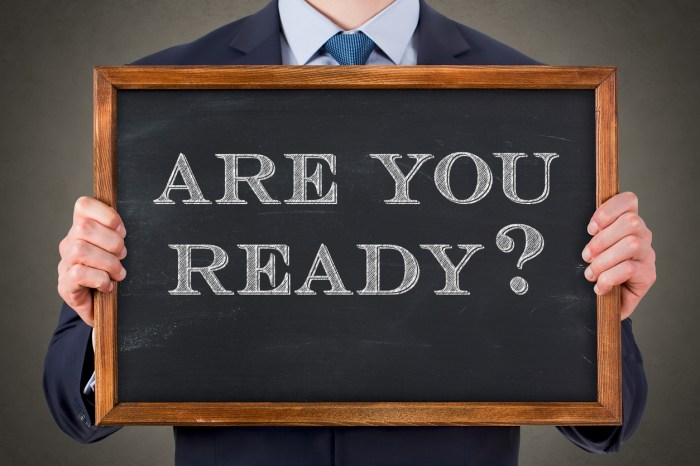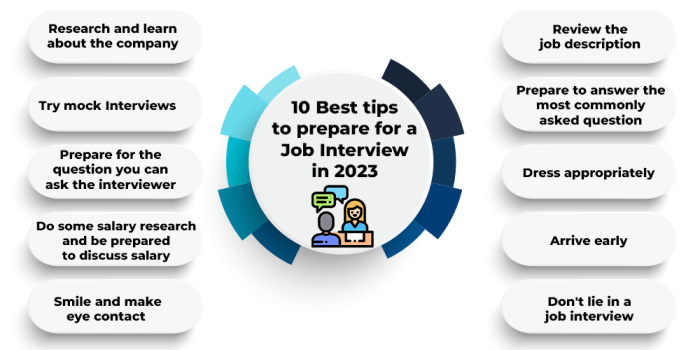Job Interview Preparation sets the stage for this enthralling narrative, offering readers a glimpse into a story that is rich in detail with american high school hip style and brimming with originality from the outset.
Are you ready to dive into the world of job interviews and come out on top? Let’s explore the essential strategies to help you shine in your next interview!
Researching the Company
Researching the company before a job interview is crucial as it shows your interest, preparedness, and dedication to the position. It enables you to align your skills and experiences with the company’s values and goals, making you a strong candidate.
Where to Gather Information
- Visit the company’s official website to learn about their products/services, mission, and recent news.
- Check out the company’s social media profiles for updates, employee testimonials, and company culture.
- Read recent press releases, annual reports, and financial statements to understand the company’s performance and growth.
- Utilize professional networking platforms like LinkedIn to see employee profiles, connections, and company insights.
Impact on the Interview
Knowing about the company demonstrates your genuine interest and allows you to tailor your responses to show how your skills align with their needs. It also helps you ask relevant questions during the interview, showcasing your knowledge and enthusiasm for the role.
Common Interview Questions
When preparing for a job interview, it’s important to anticipate common questions that may be asked by the interviewer. Being prepared with thoughtful responses can help you stand out as a candidate.
Behavioral Questions
Behavioral questions are often used by interviewers to assess how candidates have handled situations in the past. When answering these types of questions, it’s helpful to use the STAR method:
– Situation: Describe the context of the situation
– Task: Explain the task or challenge you were faced with
– Action: Detail the actions you took to address the situation
– Result: Share the outcome of your actions and any lessons learned
Tailoring Responses to Fit Job Requirements
To tailor your responses to fit the job requirements, make sure to carefully review the job description and understand the key qualifications and skills needed for the role. When answering questions, focus on highlighting experiences and achievements that demonstrate your fit for the position. Use specific examples that showcase your relevant skills and experiences.
List of Common Interview Questions, Job Interview Preparation
- Can you tell me about yourself?
- What are your strengths and weaknesses?
- Describe a time when you faced a challenging situation and how you resolved it.
- Why do you want to work for this company?
- Where do you see yourself in five years?
Dressing for Success: Job Interview Preparation

When it comes to a job interview, dressing appropriately is crucial as it creates a first impression that can impact the outcome of the interview. Your attire reflects your professionalism, attention to detail, and respect for the opportunity.
Corporate Interview Attire
- Suit (dark colors like navy or charcoal)
- Collared shirt (white or light blue)
- Conservative tie
- Closed-toe dress shoes
- Minimal accessories
Creative Interview Attire
- Blouse or button-down shirt
- Tailored pants or skirt
- Statement jewelry or accessories
- Stylish yet professional shoes
- Express your personal style while maintaining professionalism
Grooming and Accessories Tips
- Ensure clothes are clean, pressed, and well-fitted
- Maintain good personal hygiene
- Neutral nail polish and minimal makeup for a polished look
- Limit strong scents
- Carry a professional bag or briefcase
Mock Interviews
Mock interviews are a crucial step in preparing for the real deal. They provide a simulated experience that helps you practice and improve your interview skills. Here’s how you can make the most out of mock interviews:
Benefits of Mock Interviews:
- Gain confidence: Practicing in a mock interview setting can help boost your confidence when facing the actual interview.
- Identify weaknesses: Mock interviews can highlight areas where you may need to improve, such as communication skills or knowledge about the company.
- Receive constructive feedback: Feedback from mock interviews can provide valuable insights on how to enhance your performance.
- Reduce anxiety: By going through the motions in a simulated interview, you can reduce nervousness and better manage stress on the actual day.
Organizing and Conducting Mock Interviews:
- Find a reliable mock interviewer: Choose someone who can provide constructive feedback and simulate a realistic interview experience.
- Set up a mock interview environment: Create a professional setting with appropriate attire, resume, and common interview questions.
- Practice common interview scenarios: Go through typical interview questions and responses to prepare for a variety of situations.
- Record the mock interview: Recording the session can help you review your performance and identify areas for improvement.
Improving Performance with Feedback:
- Listen attentively to feedback: Pay attention to both positive comments and areas for improvement to enhance your performance.
- Implement feedback in practice sessions: Use the feedback received to refine your answers and approach in future mock interviews.
- Track progress: Keep track of feedback received and monitor improvements over time to gauge your growth and development.
- Seek additional feedback: Don’t hesitate to conduct multiple mock interviews and gather feedback from different sources to gain diverse perspectives.
Follow-up Etiquette

Sending a follow-up message after a job interview is crucial in demonstrating your continued interest in the position and expressing gratitude for the opportunity to interview.
Crafting a thank-you email or note:
Crafting a Thank-You Message
- Address the interviewer by name and thank them for their time and consideration.
- Reference specific points discussed during the interview to show your engagement.
- Reiterate your interest in the position and why you believe you are a good fit.
- Keep the message concise and professional.
Following up can leave a lasting impression on the interviewer:
Impression on Interviewer
- Shows professionalism and attention to detail.
- Highlights your communication skills and gratitude.
- Keeps you fresh in the interviewer’s mind among other candidates.
- Can provide an opportunity to address any follow-up questions or concerns.
